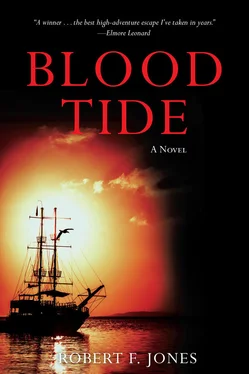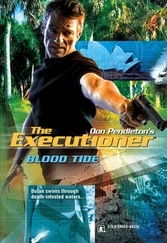Robert Jones - Blood Tide
Здесь есть возможность читать онлайн «Robert Jones - Blood Tide» весь текст электронной книги совершенно бесплатно (целиком полную версию без сокращений). В некоторых случаях можно слушать аудио, скачать через торрент в формате fb2 и присутствует краткое содержание. Год выпуска: 2014, Жанр: Старинная литература, на английском языке. Описание произведения, (предисловие) а так же отзывы посетителей доступны на портале библиотеки ЛибКат.
- Название:Blood Tide
- Автор:
- Жанр:
- Год:2014
- ISBN:нет данных
- Рейтинг книги:5 / 5. Голосов: 1
-
Избранное:Добавить в избранное
- Отзывы:
-
Ваша оценка:
- 100
- 1
- 2
- 3
- 4
- 5
Blood Tide: краткое содержание, описание и аннотация
Предлагаем к чтению аннотацию, описание, краткое содержание или предисловие (зависит от того, что написал сам автор книги «Blood Tide»). Если вы не нашли необходимую информацию о книге — напишите в комментариях, мы постараемся отыскать её.
Blood Tide — читать онлайн бесплатно полную книгу (весь текст) целиком
Ниже представлен текст книги, разбитый по страницам. Система сохранения места последней прочитанной страницы, позволяет с удобством читать онлайн бесплатно книгу «Blood Tide», без необходимости каждый раз заново искать на чём Вы остановились. Поставьте закладку, и сможете в любой момент перейти на страницу, на которой закончили чтение.
Интервал:
Закладка:
They stood at the chart table while Captain Sôbô Katana explained the operation. The Moros had gone, and only Kasim remained with them, nodding and smiling gloriously at every stab of the pointer.
“Millikan has two bases here,” Sôbô said. “This boat basin on San Lázaro itself, not far from his house, which also serves as a kind of headquarters. And a larger base on Balbal, right here.” He tapped the chart. “The boat basin doesn’t seem to be protected by an antisubmarine or -swimmer net, and apart from the Tausuq boat crews and Millikan’s mechanics it appears only lightly guarded. There are at least eight, maybe ten, fast boats there. Blue Thunders, American-built, capable of fifty or sixty knots flank speed and armed with M60 machine guns—7.62 millimeter weapons with a rate of fire of six hundred rounds per minute, slow by modern standards—and some sort of antiaircraft missile system, shoulder-held. There are machine shops, barracks, a small armory, and a fuel dump associated with the boat-basin facility.
“We don’t know much about the base at Balbal, though. It can be reached only through a narrow channel leading inland from the shore. Once a week a flying boat comes in from the east—looks like an ancient Mariner, no pun intended, a PBM of elderly aspect. Maybe Philippine Navy? No markings. The drugs Millikan’s fast boats bring in from points west, Thailand mainly, are transshipped on the Mariner, probably to Mindanao. Where they go from there, we don’t know. We do know, however, that the commodore has an old U.S. Navy river gunboat up at the far end of the Balbal channel. She’s not much to worry about, though. That class was built around 1927 in Shanghai for patrol work on the rivers of interior China. USS Panay was one of them. You must remember her, Bosun? Japanese naval aircraft sunk her in the Yangtze, upriver from Nanking, on 12 December 1937. A famous incident at the time, but Washington preferred to look the other way. For that the imperial navy was always grateful. We weren’t ready then. . . . But I digress. These river gunboats are 191 feet long, displace some 450 tons, and are armed with single-barreled three-inch guns fore and aft, complemented by ten .30-caliber machine guns at her waist and topside. They are shoal-draft vessels, potentially capable of eighteen knots. But we are told that Millikan’s gunboat, the Moro Armado , is a bit wheezy in her old age. As aren’t we all?” He smiled at Culdee and swung the pointer between them. “All she can do is an unreliable ten or twelve.”
“That’s still a lot more knots than our schooner can crank out,” Culdee said.
Sôbô raised his eyebrows and smiled again, cryptically.
“In any event,” he continued, “in order to retake Captain Miranda’s vessel, which is anchored here”—he tapped the chart just off Millikan’s house/headquarters on San Lázaro—“we must neutralize both bases. Though we have plenty of pump boats and adequate small arms, we are still outgunned, and we can certainly be outrun by Millikan’s Blue Thunders. To stand any chance of completing this mission, we must make maximum use of the element of surprise.”
“Like at Pearl Harbor,” Culdee said.
“Precisely. And Savo Island, among other places. Yes, surprise—and temerity. With those factors in our favor, we can succeed. And we will begin early tomorrow with my plan, which I shall reveal to you in full later—on a scouting expedition to San Lázaro. I should like Captain Miranda to accompany Kasim here and Mr. Pascal”—he swung the pointer toward Efreddio—“in a pump boat to reconnoiter the boat basin and get an accurate estimate of enemy forces present. Also to study the Sea Witch’s anchorage, from a safe distance, and to see how many persons are aboard her. When we execute the plan, which I have code-named Operation Seamark in honor of the vessel’s true name, the furor over our double attack on the two bases will cover the cutting out and withdrawal of that vessel, our primary target. Now I’m sure you’re all tired from your long and no doubt harrowing voyage. My, my, across the Pacific in just seven weeks! Under sail! I’ve had quarters prepared for you on this station. As you’ve probably guessed, this was an imperial navy submarine repair and replenishment base in the late war. Your quarters are officers’ quarters. I hope you will find them comfortable. Any questions?”
“Yes,” Miranda said. “Just why in the world are you and this Padre Cotinho and all these men—Kasim and his crew—going to all this trouble just to get a piddling little sailboat back for an American woman you don’t even know? What’s in it for you?”
“A battle,” Sôbô said, smiling. “A good, rousing sea fight for a just cause. It’s as simple as that, Captain.”
And I’m afraid it’s not, Miranda thought.
“Is all right,” Kasim said, patting Miranda’s shoulder. “Capitán Katana good man. He my friend, I your friend. We all fight together, kill unbelievers, all go to heaven in the end. You see.”
Padre Cotinho sat in a faded canvas lawn chair under a flowering hibiscus tree, looking down on the cathedral and, beyond it, on the whole blue and green sprawl of the Flyaways. He was drinking tuba asesina cut with papaya juice. He knew Padre Fagundes, watching him from the window of the nearby rectory, would be shaking his head sadly, as always. Rum from a priest’s sacred chalice! At seven in the morning! He and Diogo Fagundes had grown up together in the slums of Lisbon, had attended the Jesuit seminary in Spain together, had both been posted to the Philippines, where the Society of Jesus traditionally served in the vanguard of missions to the Moros. But while Cotinho had long ago grown disillusioned with the Church’s role in social reform, turning finally—reluctant at first, then with ever fiercer certainty of its justice—to violent revolution as the answer, Fagundes had remained complacent in the face of Macoy’s atrocities. A capon, Cotinho thought. But at least a loyal one. My capon. He sipped from the chalice.
Bees buzzed loud in the overhead blossoms, angrily almost, but not so furiously as Padre Cotinho. He had disapproved of the book bomb right from the start. Even if it had worked, it would have alerted Torres at least to the fact that something was going on. Now the bomb had merely killed Rosalinda Aguinaldo’s most trusted messenger. Millikan was not even wounded. He would certainly react. He would certainly redouble his watchfulness, alert his men, take radical measures to ascertain who was trying to kill him, and why. But the revolutionary powers in Mindanao had approved the bomb plot. In fact, it was their idea. Better to kill the American commander in one stroke, they caviled, than risk defeat with Katana’s plan. Nonsense. All they knew was bombs and knives in the night. They’d been reluctant to undertake the destruction of the Millikan operation right from the start. Cotinho had been watching it for more than a year now.
“Let us expose American corruption here in the Sulu Sea,” he had argued in their councils. “The American press will love it. It will discredit the U.S. once and for all in Philippine eyes—in the eyes of all Asia, and the world. The American navy running drugs in from Thailand to further debase the American people—American youth in chemical chains forged by the U.S. Navy! And at the same time preparing a stronghold for the subsequent reconquest of the Philippines once our revolution has succeeded.”
“They will deny it,” the leadership replied. “They will maintain that the proof we provide is faked. Besides, the American people are bored with saying no to drugs. It will only increase American jingoism and lead to a stronger American presence, greater American military aid to the puppet government in Manila.”
Читать дальшеИнтервал:
Закладка:
Похожие книги на «Blood Tide»
Представляем Вашему вниманию похожие книги на «Blood Tide» списком для выбора. Мы отобрали схожую по названию и смыслу литературу в надежде предоставить читателям больше вариантов отыскать новые, интересные, ещё непрочитанные произведения.
Обсуждение, отзывы о книге «Blood Tide» и просто собственные мнения читателей. Оставьте ваши комментарии, напишите, что Вы думаете о произведении, его смысле или главных героях. Укажите что конкретно понравилось, а что нет, и почему Вы так считаете.












